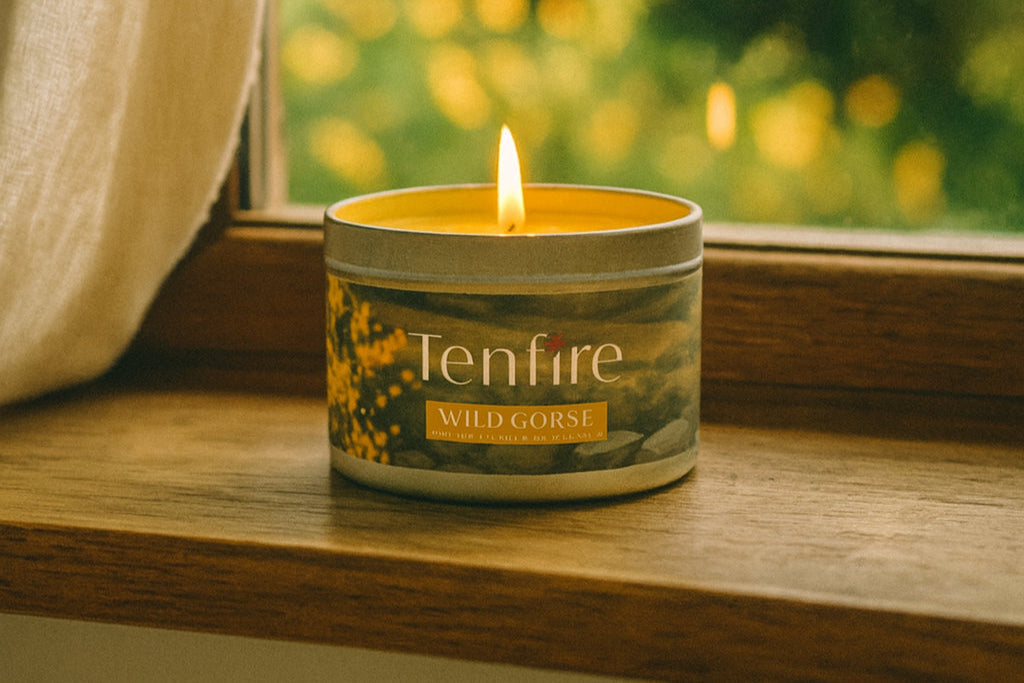
The Science of Fragrance: How Scent Affects Mood and Atmosphere
By Dawn, Founder of Tenfire
Fragrance isn’t just decorative – it’s deeply biological. The right scent can calm your nervous system, lift your mood, or make a space feel more like home. In this guide, we explore the science behind how scent works on the brain, why certain smells trigger strong emotions, and how to use this knowledge to create the right atmosphere with Tenfire candles and melts.
TL;DR
- Fragrance directly affects mood and atmosphere through brain pathways linked to emotion and memory.
- Certain scent families can calm, energise, comfort, or refresh you.
- Tenfire candles and melts make it easy to create intentional spaces that match your emotional needs.
How Scent Works in the Brain
Of all our senses, smell is the most direct. When you inhale, scent molecules travel straight to the olfactory bulb – a part of the brain just above the nasal cavity. From there, messages are sent to the amygdala (which processes emotion) and the hippocampus (which handles memory).
That’s why scent doesn’t just inform – it transforms. You don’t think about a smell, you feel it.
It’s also the only sense that bypasses the brain’s thalamus filter. This means scent has a shortcut to your emotional core – affecting how you feel before you’re even aware of it.
Why Fragrance Triggers Emotion and Memory
We’ve all experienced it: a scent from childhood, a perfume worn by someone you loved, or the smell of a season—suddenly, you're transported.
This is known as Proustian memory, named after the French writer Marcel Proust, who wrote of a flood of childhood memories triggered by the scent of a madeleine cake dipped in tea.
Scientific studies back this up. One study published in Chemical Senses (2004) found that smells produce more vivid emotional memories than images or sounds. The emotional intensity was stronger and more immediate.
Founder’s note:
This is why Irish scents are at the heart of Tenfire. Turf smoke, cut grass, wildflowers – you don’t just smell them, you remember them. And if you’ve never smelled them before, they still feel familiar.

Scent and Mood: What the Research Says
Numerous studies have shown that specific fragrance families can influence how we feel:
| Scent Type | Effect on Mood | Common Notes |
|---|---|---|
| Citrus | Energising, uplifting | Lemon, orange, grapefruit |
| Lavender | Calming, sleep-supportive | Lavender, chamomile |
| Woody | Grounding, steadying | Cedarwood, turf, sandalwood |
| Floral | Comforting, nostalgic | Rose, jasmine, whitethorn |
| Green | Refreshing, clarifying | Grass, mint, eucalyptus |
| Sweet | Cosy, indulgent | Vanilla, tonka, wild gorse |
A 2005 study published in Physiology & Behavior showed that lavender lowered heart rate and reduced anxiety in test subjects. Other studies have found that citrus scents can improve alertness and mood, especially in the morning.
What this means for your home: you can use scent to gently nudge your emotional state – whether you’re looking to relax, recharge, or simply feel more grounded.
Creating Atmosphere with Fragrance
Fragrance plays a powerful role in the emotional feel of a room. Here’s how scent shapes space:
- Living Room: A Turf candle makes the space feel grounded, cosy, and settled. Add a Wild Gorse melt for a lift of warmth.
- Kitchen: Try Cut Grass or Irish Rain to create a clean, fresh energy. Citrus notes are also brilliant here.
- Bedroom: A Wild Gorse melt or Whitethorn candle brings softness and calm.
- Bathroom: Herbal or marine-based scents help create a spa-like freshness.
Tip: Scent works best when it aligns with lighting, texture, and even sound. Soft lighting + earthy scent = instant calm.
Choosing Scents That Support How You Want to Feel
Rather than just picking scents you like, think about how you want your space to feel.
- Feeling Stressed? Turf, Irish Coastal Mist, or Cedarwood help signal safety and calm.
- Need a Boost? Cut Grass, Mint, or Lemon Balm stimulate alertness.
- Craving Comfort? Wild Gorse or Vanilla notes offer enveloping sweetness.
- Seeking Focus? Rosemary and Eucalyptus can enhance mental clarity.
Founder’s note:
When I’m preparing candle batches, I always choose my scent based on the day’s mood. Turf on grey days. Whitethorn when I need to feel soft. Cut Grass when I’m dragging and need to reset.
Everyday Applications of Fragrance Psychology
- Morning Ritual: Use a citrus or green candle to brighten your morning. Even 10 minutes of scent can help reframe the day.
- Afternoon Slump: Switch on a wax melt warmer with something crisp and herbal to refresh without coffee.
- Evening Wind-Down: Choose woody or floral base notes like Turf to create a quiet atmosphere. Pair with a warm blanket and screen-free time.
-
Seasonal Scenting:
- Spring: Cut Grass + Whitethorn
- Summer: Wild Gorse + Irish Rain
- Autumn: Turf + Cosy Up
- Winter: Turf + Vanilla or Mulled
Use scent to keep your home in rhythm with nature – it’s a subtle but powerful shift.
Final Thoughts
Fragrance might feel like a small detail, but it’s one of the fastest ways to shift your space – and your state of mind. Once you start using scent intentionally, everything else begins to align around it. It becomes more than background. It becomes part of how you care for yourself and your home.
That’s the science—and the magic—of fragrance.
— Dawn





